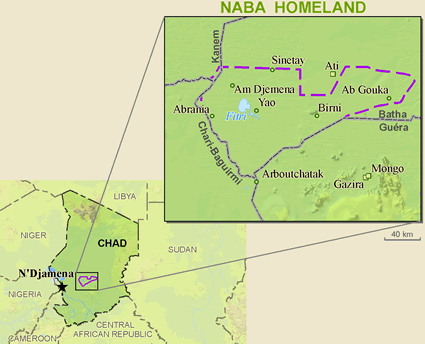Lisi is a collective term used to describe three ethnic groups living in the same geographical region: the Kuka, the Bilala, and the Medogo. The groups speak similar languages, intermarry, share the same religion, and have similar traditions. They are located around Lake Fitri, Yao, and Oum Hadjer, in the Batha Prefecture of northern Chad.
The Lisi are descendants of the main ethnic groups of the Yao sultanate. During the 1400s, the Bilala people founded the state of Yao. The culture and language of the Bilala, unlike those of the other two groups, are of Arab origin. However, the Bilala have mixed so much with the Kuka and the Medogo over the centuries that we include them as a Lisi subgroup. All the groups speak languages that are mutually understandable. They also speak Arabic as a trade language. We can say the same thing about each of the three in terms of their lifestyles and cultures.
The Medogo are primarily farmers, growing crops such as millet, sorghum, cotton, and manioc (a shrubby plant widely grown for its large, tuberous, starchy roots). Women usually have their own plots of land near their homes. There, they cultivate vegetables for family consumption or for sale. They also gather wild rice, roots, locust beans, and wild fruits from the forests near Lake Fitri.
Some of the Medogo combine farming with livestock production. They often have sheep, horses, camels, and a few cattle. Unlike most of their southern neighbors, the Lisi milk their animals and make butter. Women perform this task. Others also engage in small scale hunting and fishing. The men do the hunting, herding, and most of the fishing. The women do some fishing, help the men with the agricultural work, and gather forest produce. In addition, the women perform all the domestic duties such as preparing the meals, collecting the firewood, and caring for the children. The entire region of northern Chad has several local and regional markets. The men usually trade in the larger regional markets in caravans, while the women engage in petty trade at the local markets near their villages.
The Medogo people live in compact villages, each of which is run by a local chief or headman. The chief and the village elders are to settle disputes between the villagers. The rural Medogo live in round huts which have mud-brick or mat walls and cone-shaped thatch roofs. In the larger towns, the dwellings are also made of mud-brick, but they have flat roofs made of beaten earth. The villages comprise several fenced-in, rectangular compounds. Each compound contains several huts belonging to an extended family.
Polygyny (the practice of having multiple wives) is common among the Medogo. However, according to Islamic law, no man may have over four wives. The first wife has a privileged status and is considered the "chief" among the others. Each additional wife has her own hut where her children will live with her until they are old enough to live on their own.
A Medogo girl will live in her mother's hut until she is ready to marry. However, a boy will move out of his mother's hut as soon as he is old enough to build his own hut—usually when he reaches puberty. He also undergoes his initiation into manhood.
The Medogo are virtually all Muslim. The nearby Muslim Arab merchants have strongly influenced them, with whom they trade regularly. Although they still practice some of their pre-Islamic rituals, they strongly follow Muslim laws and traditions along with those practices.
Islam is a religion of works based on five basic teachings or "pillars." Muslims must affirm that "there is no god but Allah, and Mohammed is his prophet." They are also required to pray five times a day, give alms to the poor, fast during the month of Ramadan, and try to make at least one pilgrimage to Mecca.
The Medogo need more educational opportunities and quality health care facilities. Perhaps Christian teachers and medical workers will have the greatest opportunities to share the love of Jesus with them.
The Medogo are also in need of Christian resources in their own language. A majority of the Medogo have never yet heard a clear presentation of the gospel that Christ came to save sinners. Additional laborers, Christian broadcasts, and evangelistic literature are needed to reach the Medogo with the gospel. They need people who will begin to intercede for them, tearing down the strongholds that are keeping them in spiritual bondage. Only then will their hearts be prepared to receive the gospel as it is presented to them.
Ask the Lord of the harvest to send forth laborers into northern Chad to work among the Medogo.
Ask the Holy Spirit to grant wisdom and favor to the mission agencies that may be focusing on the Medogo.
Pray that God will give the small number of Lisi believers boldness to share Christ with their own people.
Ask God to raise up prayer teams who will begin breaking up the spiritual soil of Chad through worship and intercession.
Ask the Lord to bring forth many fellowships of believers among the Kuka, the Medogo, and the Bilala for the glory of his name!
Scripture Prayers for the Medogo in Chad.
| Profile Source: Joshua Project |











